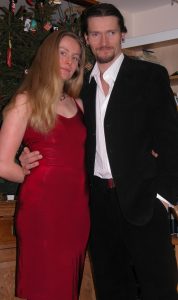I was lied to by the police in a public apology that was supposed to be reparation for their deceit and abuse
In 2003 I fell in love with a man who did not exist. He was charismatic and romantic, and shared many of my interests and dreams. We lived together as lovers for more than a year. We travelled. He was close to my family, and placed himself at the centre of my world. We were the closest friends for seven years. I last saw him in August 2010. He took me for dinner, and afterwards we walked along the river and talked about our lives.
Two months later I received a phone call: Mark Stone was not the man I thought I knew. He was Mark Kennedy, an undercover police officer. He had been paid to infiltrate environmental and social justice protest groups, and provided with funding and resources to deceive me. He’d been followed everywhere by a team of handlers, managers and other senior officers. He was under orders, and manipulating my emotions and actions according to their operational aims.
That devastating phone call has been followed by a steady and unending stream of revelations about the abusive behaviour of Britain’s secret political police. I’ve since learned that at least seven other people I knew were undercover. I met other women who had been deceived, manipulated and abused like me, not only by Kennedy but by many other officers. In 2011, eight of us began a legal claim against the police. We wanted answers, compensation for damages, and to be sure that this could never happen again.
Since then, everything the police have done has been to avoid telling the truth. We were bullied; they tried to get the claims struck out; we were told the operations were legitimate and the relationships were based on “genuine feelings”; and then told to forget that – in fact the police could neither confirm nor deny the identity of an undercover officer. For the case to proceed, we had to provide deeply invasive disclosure about our psychological wellbeing and private lives, and we were given no answers or evidence in return.
Very early on, the police denied our claims that our human rights had been violated, and argued that they should not be heard in the high court but by a secretive body known as the Investigatory Powers Tribunal (IPT). Finally, years later, they decided to apologise, and bring an end to the high court claim. It was a bitter victory, because the next step would have been disclosure of their evidence. They made it clear they would say sorry, but they were not going to offer any answers.
The police tactic in all undercover abuse cases has been to delay and deny until there is no other option, and then make sacrificial admissions, sticking where possible to what is already publicly known. In this way they close the cases, protect their secrecy and prevent people getting the truth. That is not accountability, it is a form of damage limitation whereby they still manage the information and stay in control.
After we settled in the high court, my human rights claim remained live in the IPT, and I decided to continue the fight. The police have been forced to make a tiny amount of disclosure there, and already that has led to massive revelations: they now admit that what was done amounted to a violation of my right not to be subject to torture or inhumane and degrading treatment, a grave invasion of my private and family life and a violation of my rights to freedom of expression and assembly. They also admit that Kennedy’s handlers and line manager knew about and “acquiesced to” his relationship with me.
I and others settled our civil claims for an apology which said “these relationships would never have been authorised” and were the result of “failures in oversight and management”. Yet I have now received confirmation that the people giving Kennedy his orders knew. I was lied to by the police in a public apology that was supposed to be reparation for their deceit and abuse.
Now I really want answers. I want to know how high up the police hierarchy knowledge of the abuses went. I want access to the 10,000 documents they claim to hold on me, and to know why at least eight police officers were sent to deceive me and spy on every area of my life. I want the court to examine the institutional sexism and political prejudices that informed the decisions they made, and to look at the legality of the operations and the inadequate laws that are supposed to protect our human rights.
These are deeply important personal issues for me, but they are also fundamental questions about political policing in a country that believes itself to be free. These police units illegally blacklisted trade union activists, and they spied on elected politicians, the families of victims of police violence and many campaign or protest groups. They used the identities of dead children with no thought for their families, they violated lawyer-client privilege and caused countless miscarriages of justice, and they sexually abused women.
Although we have been fighting legal battles for years, this is the first time a case about undercover relationships has got far enough that facts and evidence are being looked at by anyone outside the police. On 3 October, my case has its next hearing, and the police, true to form, are trying to shut it down. We will be demonstrating outside the tribunal, calling for the case to be allowed to continue. I hope you will support us, spread the word and keep up the pressure to get to the truth about undercover abuse.
This piece was written by Kate Wilson, and published in the Guardian on 21st September 2018


